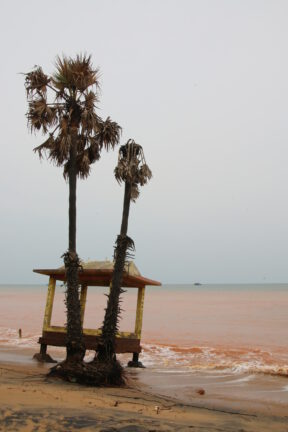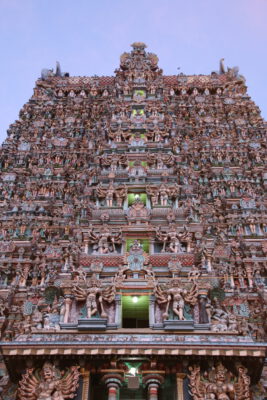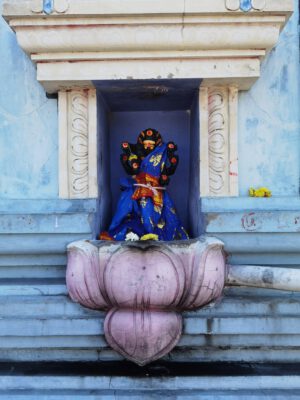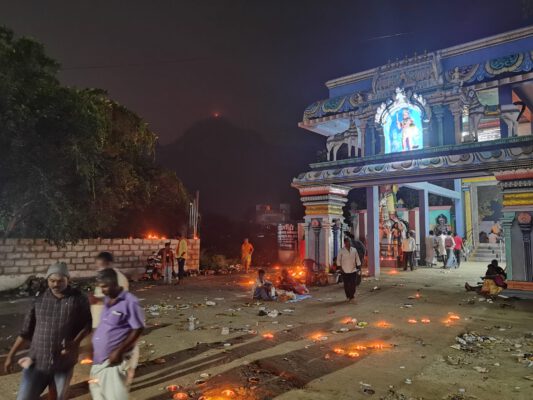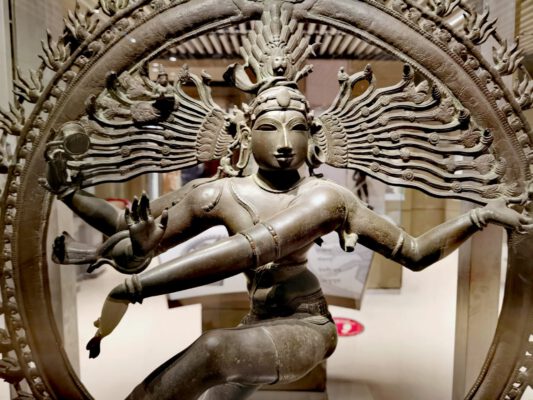II am slowly approaching Sanskrit. On Thursdays, Nishtha holds a seminar on the Rigveda. The joint recitation in Sanskrit, the detailed analysis of the translation, Nishtha's philological reflections and the explanations on the psychology of the gods open up access to these 'sacred' texts.
I remember my Latin studies, the Indo-European roots, the sounds that echo in the ragas, phonetics as a declaration of existence, language as sound and vibration, communication as rhythm. The breath of life, yoga, vitality, thinking in levels of movement and the transcendence of this level to the Self (Atman) held in the Self (Brahman). All of this is fueled by my study of the Upanishads. So much so that yesterday I took Gilles Deleuze off the shelf again. In his book "What is Philosophy"The second chapter is called 'Plane of Immanence'. It is this 'Plane of Immanence' that philosophically built the bridge to India for me, purely intuitively, because I didn't understand it. I talked about it for years because I wanted to understand it. I knew I didn't understand it, now I see why.
Language
I have never really thought about concepts. That sounds strange, because I have analyzed language (Frege, Saussure, Derrida, etc.), I have dealt with the content of language (Husserl, H.N. Castaneda, Quine, N. Goodman, etc.), I have analyzed the aesthetics of signs (Pierce, Danto, Welsh, Bense, etc.). In my reading, language is always part of consciousness, only as conscious speaking, reading, listening does language make 'sense'. Ultimately, then, it is about theories of consciousness. In short, I have thought about the function of language, its reference, the ability to communicate, its social, political, sociological implications, without really thinking about the nature of concepts. What do I mean by that?
Ideally, language is structured in grammatically 'correct' sentences. These sentences have a structure (in the simplest form subject - predicate - object). They correspond to a meaning, i.e. the content of the sentence that we are trying to communicate or that we think we understand. The dominant 'Western' language-analytical philosophy is now primarily concerned with the question of which sentences are true and which are false. To do this, of course, it must first be determined under what circumstances sentences can generally be true or false. It is therefore a question of the relationship of propositions to the world and the relationship of propositions to their meaning, and the relationship of meaning to the world. This is no easy task, and in order not to lose the thread, philosophy is oriented towards logic. The common root of logic and language lies in propaedeutics. All other sciences can then be tested for their claim to validity on this foundation.
What's wrong with that?
Diagrams and concepts in teaching
I thought a lot about diagrams when I was teaching in the US and used them in my seminars. I was skeptical about them during my studies. It seemed lazy to me to express a lack of conceptual acuity through diagrams. Diagrams - so I thought - are always shown when something complicated cannot be expressed clearly. I had been trained to believe that this conceptual clarity was achievable as a long-term goal - a core idea of the Enlightenment. The term 'Term' is thought of in very technical terms. (See Frege Function and concept from 1891). For Frege, terms are predicates capable of truth, or something like that... there is unspeakable trench warfare.
Deleuze, on the other hand, says very clearly that concepts are not unambiguous, that they overlap and have anything but clear boundaries. They exist on one or many different levels (planes):
"Philosophical concept are fragmentary wholes that are not aligned with one another so that they fit tgether, because their edges do not match up. (...) They resonate nonetheless, and the philosophy that creates them always introduces a powerful Whole that, while remaining open, is not fragmented: an unlimited One-All, an 'Omnitudo' that includes all the concepts on one and the same plane." (p.35)
"Concepts are like multiple waves, raising and falling, but the plane of immanence is the single wave that rolls them up and unrolls them" (p.36)
"Concepts are the archipelago or skeletal frame, a spinal column rather than a skull, whereas the plane is the breath that suffuses the separate parts." (p.36)
Every great philosopher, every epoch has its own plane. There are many planes. The Renaissance is different from Romanticism, Kant is different from Nietzsche. It would be absurd to think that the same terms mean the same thing in different contexts. In his late work, Deleuze is concerned with the different levels (planes). The 1000 plateaus were perhaps the experimental kit for this.
Levels (planes)
What is a level and what is a concept? I think that this is the core of Deleuze's thinking. For him, concepts are agile, planes are the 'dimensions' in which they operate. The level (plane) of immanence is absolute. Deleuze's thinking is alive, it changes, not only for him, but in itself. Film is thinking - also a plane on celluloid. How does a concept emerge, how are connections created between concepts, how do thoughts constitute a view of the world?
For me, Deleuze is a philosopher of immanence. How do habitats (territories) form from geological strata? How does a living being define its habitat and how, when and why does it leave it and how does it then transform itself? What does it become (Becoming)? Can it come back (territorialization and de-territorialization)? How does communication take place within it (rhythm), how are milieus formed?
My suspicion?
My suspicion is that Deleuze's thinking is not so far removed from the Vedic worlds of thought. The project is exciting. The Vedic scriptures were only passed down orally for centuries before they were written down, and they are still little understood today. I like Sri Aurobindo's reading, which contrasts the Western reading of soulless scholars with the elemental force of spiritual thought in India. Whether this is always philologically correct is not for me to judge.
In any case, Aurobindo activates the Vedic scriptures. He brings out their philosophical rigor, embeds them in human experience and spiritual thinking and shows that this is the beginning of philosophy. This beginning does not appear in the form of a delicate emergence, but powerfully as a vision of essence, as an enlightened vision of a spiritual truth that attempts to answer the central questions of our existence. In this sense, the Vedic scriptures are more than philosophy for Aurobindo. They contain philosophy but go beyond it, not irrational, mythical, ritualistic and barbaric, but clear in their address to our existence. Where do we come from and what is our task? To answer this truly is the attempt of the Vedic scriptures.
I see resonances in the levels (planes) of the Vedic scriptures and Deleuze's levels (planes). The gods of the Vedas and the unleashed concepts of Deleuze are not so dissimilar. The philosophy of immanence feeds both. Everything is one. It is about understanding life.
OM TARE TUTTARE



